
BURNES, SIR ALEXANDER (1805-1841), British traveller, explorer and writer, was born on 16 May 1805. He joined Bombay infantry in 1821. Upon his arrival in India, he devoted himself to the study of the local languages and was, while still an ensign, selected for the post of regimental interpreter. In 1829, he was transferred to the political department as assistant to the Political Resident in Cutch. In 1831, he was sent on a complimentary mission to Lahore, in charge of English horses, including a team of carthorses, four mares and a stallion, sent by the King of England as presents for Maharaja Ranjit Singh.
CLERK, SIR GEORGE RUSSELL (1800-1889), diplomat, son of John Clerk, entered the service of the East India Company as a writer in 1817. After various appointments in Calcutta, Rajputana and Delhi, he became political agent at Ambala in 1831. He was appointed agent to the Governor General at the North-West Frontier Agency in 1840. In this capacity, he shaped British policy towards the Sikhs during the days following the death of Maharaja Ranjit Singh. For almost a decade, as political agent at Ambala, he had been responsible for British political relations with the cis Sutlej states.

CUNNINGHAM, JOSEPH DAVEY (1812-1851), the first British historian of the Sikhs (his A History of the Sikhs was published in London in 1849), was the eldest of the five sons of Allan Cunningham, a noted poet and playwright. Born at Lambeth on 9 June 1812, Joseph had his early education in private schools in London where he showed such a marked aptitude for mathematics that his father was advised to send him to Cambridge. But as the young boy was more keen on becoming a soldier, a cadetship in the East India Company`s service was procured him through the good offices of Sir Walter Scott.





